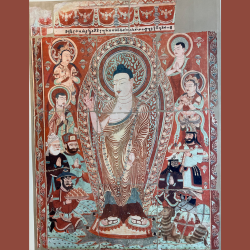
Please join the East Asia Research Forum and the Department of History as they host Johan Elverskog (Southern Methodist University) for this talk.
Today, most Uyghurs are Muslims. For centuries, however, Uyghurs were Buddhists. By around 1000 CE, they, like many of their neighbors, had decisively turned toward the Dharma, and a golden age of Uyghur Buddhism flourished under the Mongol empire. Dwelling along the Silk Road in what is now northwestern China, they stood at the center of Buddhist Eurasia, linking far-flung regions and traditions. But as Muslim power grew, Uyghur Buddhists converted to Islam, rewriting their past and erasing their Buddhist history.
Johan Elverskog traces how the Uyghurs forged their distinctive tradition, considering a variety of social, political, cultural, and religious contexts. He argues that the religious history of the Uyghurs challenges conventional narratives of the meeting of Buddhism and Islam, showing that conversion took place gradually and was driven by factors such as geopolitics, climate change, and technological innovation.
About the speaker:
Johan Elverskog is Dedman Family Distinguished Professor, professor of religious studies, and, by courtesy, professor of history at Southern Methodist University in Dallas, Texas. He is the author or editor of ten books, including, most recently, The Precious Summary: A History of the Mongols from Chinggis Khan to the Qing Dynasty (Columbia, 2023).
Audience
- Faculty/Staff
- Student
- Post Docs/Docs
- Graduate Students
Interest
- Academic (general)